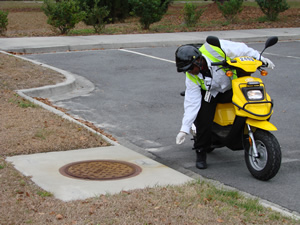Stormwater and Ground Control Division
Ground control staff have two missions: ground based ultra-low volume spray operations and stormwater catch basin treatment. Chatham County is divided into 54 spray areas, each requiring four to five hours to treat for adult mosquito control. Residents requesting notification are called prior to all operations. A binder of information specific for each spray area is carried in the spray vehicle. The binder contains maps detailing specific spray instructions, a list of which properties to avoid treating and which residents have requested that trucks come on the property. The binder also includes the pesticide label, material safety data sheet, and a Chatham County accident report form. All vehicles carry a spill kit and ground control staff are required to maintain a Georgia Pesticide Applicator License.
 Based on observations spanning 5 years, the highest WNv transmission area appears to be centered in a 23.5 square mile area in the heart of Savannah that includes the downtown, historic, and Victorian districts of the city. This is the most densely populated area of Savannah with the oldest stormwater infrastructure. Nine of the ten Chatham County residents diagnosed with laboratory-confirmed cases of WNv in 2003 and 2004 resided within this "hot zone." Having such a well-defined risk area allowed us to use motorized scooters to treat the stormwater catch basins. We first used the scooters in 2005 and worked out the logistics of using a scooter-based catch basin treatment program. The products used were Altosid® Pellets and Altosid® Pellets WSP. Using the water soluble packets proved to be most efficient, and looking to the future, gives us the ability to use similarly packaged formulations of Bacillus sphaericus Neide and alternate products to minimize the risk of developing pesticide resistance in our Cx. quinquefasciatus populations.
Based on observations spanning 5 years, the highest WNv transmission area appears to be centered in a 23.5 square mile area in the heart of Savannah that includes the downtown, historic, and Victorian districts of the city. This is the most densely populated area of Savannah with the oldest stormwater infrastructure. Nine of the ten Chatham County residents diagnosed with laboratory-confirmed cases of WNv in 2003 and 2004 resided within this "hot zone." Having such a well-defined risk area allowed us to use motorized scooters to treat the stormwater catch basins. We first used the scooters in 2005 and worked out the logistics of using a scooter-based catch basin treatment program. The products used were Altosid® Pellets and Altosid® Pellets WSP. Using the water soluble packets proved to be most efficient, and looking to the future, gives us the ability to use similarly packaged formulations of Bacillus sphaericus Neide and alternate products to minimize the risk of developing pesticide resistance in our Cx. quinquefasciatus populations.

 Part of ChathamCountyGA.gov
Part of ChathamCountyGA.gov